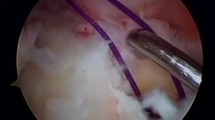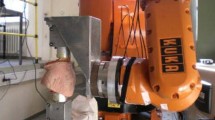Abstract
Introduction
The aim of this study was to evaluate the effect of single-bundle (SB) and anatomic double-bundle (DB) anterior cruciate ligament (ACL) reconstruction on the resulting knee kinematics in a simulated clinical setting with ACL rupture and associated extra-articular damage to the lateral structures. It was hypothesized that anatomic DB ACL reconstruction restores the intact knee kinematics in ACL/LCL-deficient knees, whereas SB ACL reconstruction fails to restore the intact knee kinematics.
Materials and methods
Ten fresh-frozen human cadaver knees were subjected to anterior tibial load of 134 N (simulated KT 1000) and combined rotatory load of 10-Nm valgus and 4-Nm internal tibial torque (simulated pivot shift) using a robotic/UFS testing system. The resulting knee kinematics was determined for intact, ACL/LCL-deficient, SB ACL-reconstructed/LCL-deficient, and DB ACL-reconstructed/LCL-deficient knee. Statistical analysis was performed using a two-way ANOVA test with the level of significance set at P < 0.05.
Results
Under a simulated KT 1000 test, anterior tibial translation (ATT) following SB ACL reconstruction was statistically significant at 0°, 30° and 60° of knee flexion when compared to the intact knee. ATT after DB ACL reconstruction showed no statistically significant difference from the intact knee; however, there was a significant difference in SB reconstruction at 0° and 30° of knee flexion. Under a simulated pivot shift test, both SB and DB ACL reconstruction failed to restore the intact knee kinematics.
Conclusion
The results of the study did not support our initial hypothesis. Though DB reconstructions were significantly superior to SB reconstruction under simulated KT 1000 test, SB as well as DB reconstruction failed to restore the intact kinematics under simulated pivot shift loads. The clinical relevance of this study is that caution and precise preoperative diagnostics are needed to avoid failure of intra-articular ACL reconstruction if the extra-articular stabilizers are torn.





Similar content being viewed by others
References
Amis A, Bull AMJ, Lie DT (2005) Biomechanics of rotational instability and anatomic anterior cruciate ligament reconstruction. Oper Tech Orthop 15:29–35
Amis AA, Scammell BE (1993) Biomechanics of intra-articular and extra-articular reconstruction of the anterior cruciate ligament. J Bone Jt Surg Br 75:812–817
Andersen HN, Dyhre-Poulsen P (1997) The anterior cruciate ligament does play a role in controlling axial rotation of the knee. Knee Surg Sports Traumatol Arthrosc 5:145–149
Bull AMJ, Amis AA (1998) The pivot shift phenomenon: a clinical and biomechanical perspective. Knee 5:141–158
Butler DL, Noyes FR, Grood ES (1980) Ligamentous restraints to anteriorposterior drawer in the human knee. J Bone Jt Surg Am 62:259–270
Cha PS, Brucker PU, West RV, Fu FH (2005) Arthroscopic double bundle anterior cruciate ligament reconstruction: an anatomic approach. Arthroscopy 21:1275–1281
Covey DC (2001) Current concepts review: injuries of the posterolateral corner of the knee. J Bone Jt Surg 83:106–118
Daniel DM, Stone ML, Sachs R, Malcom L (1985) Instrumented measurement of anterior knee laxity in patients with acute anterior cruciate ligament disruption. Am J Sports Med 13:401–407
Fanelli GC (2005) Surgical reconstruction for acute posterolateral injury of the knee. J Knee Surg 18:157–162
Freedman KB, D’Amato MJ, Nedeff DD (2003) Arthroscopic anterior ligament reconstruction: A metaanalysis comparing patellar tendon and hamstring tendon autografts. Am J Sports Med 31:2–11
Fukubayashi T, Torzilli PA, Sherman MF, Warren RF (1981) An in vitro biomechanical evaluation of anterior–posterior motion of the knee. Tibial displacement, rotation, and torque. J Bone Jt Surg Am 64:258–264
Gabriel MT, Wong EK, Woo SL, Yagi M, Debski RE (2004) Distribution of in situ forces in the anterior cruciate ligament in response to rotatory loads. J Orthop Res 22:85–89
Georgoulis AD, Papadonikolakis A, Papageorgiou CD, Mitsou A, Stergiou N (2003) Three-dimensional tibiofemoral kinematics of the anterior cruciate ligament-deficient and reconstructed knee during walking. Am J Sports Med 31:75–79
Hughston JC, Andrews JR, Cross MJ, Moschi A (1976) Classification of knee ligament instabilities. Part I. The medial compartment and cruciate ligaments. J Bone Jt Surg Am 58:159–172
Jonsson H, Riklund-Ahlstrom K, Lind J (2002) Positive pivot shift after ACL reconstruction predicts later osteoarthrosis: 63 patients followed 5–9 years after surgery. Acta Orthop Scand 75:594–599
Kanamori A, Sakane M, Zeminski J, Rudy TW, Woo SL (2000) In situ force in the medial and lateral structures of intact and ACL-deficient knees. J Orthop Sci 5:567–571
Kanamori A, Zeminski J, Rudy TW, Li G, Fu FH, Woo SL (2002) The effect of axial tibial torque on the function of the anterior cruciate ligament: a biomechanical study of a simulated pivot shift test. Arthroscopy 18:394–398
Kaplan N, Wickiewicz TL, Warren RF (1990) Primary surgical treatment of anterior cruciate ligament ruptures. A long-term follow-up study. Am J Sports Med 18:354–388
Kim YC, Chung IH, Yoo WK, Shu JS, Kim SJ, Park CI (1997) Anatomic and magnetic resonance imaging of the posterolateral structures of the knee. Clin Anat 10:397–404
Kocher MS, Steadman JR, Briggs KK, Sterett WI, Hawkins RJ (2004) Relationships between objective assessment of ligament stability and subjective assessment of symptoms and function after anterior cruciate ligament reconstruction. Am J Sports Med 32:629–634
Kujala UM, Nelimarkka O, Koskinen SK (1992) Relationship between the pivot shift and the configuration of the lateral tibial plateau. Arch Orthop Trauma Surg 111:228–229
Lane JG, Daniel D (1994) The anterior cruciate ligament in controlling axial rotation. Am J Spots Med 22:289–293
Larson RL (1983) Physical examination in the diagnosis of rotatory instability. Clin Orthop Relat Res 172:38–44
Lenschow S, Zantop T, Weimann A, Lemburg T, Raschke M, Strobel M, Petersen W (2006) Joint kinematics and in situ forces after single bundle PCL reconstruction: a graft placed at the center of the femoral attachment does not restore normal posterior laxity. Arch Orthop Trauma Surg 126:253–259
Lipke JM, Janecki CJ, Nelson CL, McLeod P, Thompson C, Thompson J, Haynes DW (1981) The role of incompetence of the anterior cruciate and lateral ligaments in anterolateral and anteromedial instability. A biomechanical study of cadaver knees. J Bone Jt Surg Am 63:954–960
Mannel H, Marin F, Claes L, Durselen L (2004) Anterior cruciate ligament rupture translates the axes of motion within the knee. Clin Biomech 19:130–135
Markolf KL, Mensch JS, Amstutz HC (1976) Stiffness and laxity of the knee—the contributions of the supporting structures. A quantitative in vitro study. J Bone Jt Surg Am 58A:583–594
Müller W (1982) Das Knie. Form, Funktion und ligamentäre Wiederherstellungschirurgie. Springer, Berlin
Olson EO, Myklebust G, Engebretsen L, Bahr R (2004) Injury mechanisms for anterior cruciate ligament injuries in team handball. A systematic video analysis. Am J Sports Med 32:1002–1012
Petersen W, Lenschow S, Weimann A, Strobel MJ, Raschke MJ, Zantop T (2006) Importance of femoral tunnel placement in double-bundle posterior cruciate ligament reconstruction: biomechanical analysis using a robotic/universal force–moment sensor testing system. Am J Sports Med 34:456–463
Petersen W, Tillmann B (1998) Collagenous fibril texture of the human knee joint menisci. Anat Embryol 197:317–324
Petersen W, Tretow H, Weimann A, Herbort M, Fu FH, Raschke MJ, Zantop T (2007) Biomechanical evaluation of two techniques for double bundle ACL reconstruction using a robotic/UFS testing system. Am J Sports Med 35(2):228–234
Ristanis S, Stergiou N, Patras K, Vasiliadis HS, Giakas G, Georgoulis AD (2005) Excessive tibial rotation during high-demand activities is not restored by anterior cruciate ligament reconstruction. Arthroscopy 21:1323–1329
Rudy TW, Livesay GA, Xerogeanes JW, Woo SLY (1994) A combined robotics/UFS approach to measure knee kinematics and determine in situ ACL forces. ASME Adv Bioeng 28:287–288
Seering WP, Piziali RL, Nagel DA, Schurman DJ (1980) The function of the primary ligaments of the knee in varus–valgus and axial rotation. J Biomech 13:785–794
Slocum DB, Larson RL (1968) Rotatory instability of the knee. Its pathogenesis and a clinical test to demonstrate its presence. J Bone Jt Surg 50:211–225
Staubli HU, Birrer S (1990) The popliteus tendon and its fascicles at the popliteal hiatus: gross anatomy and functional arthroscopic evaluation with and without anterior cruciate ligament deficiency. Arthroscopy 6:209–220
Tashman S, Collon D, Anderson K, Kolowich P, Anderst W (2004) Abnormal rotational knee motion during running after anterior cruciate ligament reconstruction. Am J Sports Med 32:974–983
Vogrin TM, Hoher J, Aroen A, Woo SL, Harner CD (2000) Effects of sectioning the posterolateral structures on knee kinematics and in situ forces in the posterior cruciate ligament. Knee Surg Sports Traumatol Arthrosc 8:93–98
Weresh MJ, Gabel RH, Brand RA, Tearse DS (1997) Popliteus function in ACL-deficient patients. Scand J Med Sci Sports 7:14–19
Woo SL, Kanamori A, Zeminski J, Yagi M, Papageorgiou C, Fu FH (2002) The effectiveness of reconstruction of the anterior cruciate ligament with hamstrings and patellar tendon. A cadaveric study comparing anterior tibial and rotational loads. J Bone Jt Surg Am 84:907–914
Yagi M, Wong EK, Kanamori A, Debski RE, Fu FH, Woo SL (2002) Biomechanical analysis of an anatomic anterior cruciate ligament reconstruction. Am J Sports Med 30:660–666
Yasuda K, Kondo E, Ichiyama H, Tanabe Y, Tohyama H (2006) Clinical evaluation of anatomic double-bundle anterior cruciate ligament reconstruction procedure using hamstring tendon grafts: comparisons among 3 different procedures. Arthroscopy 22(3):240–251
Zantop T, Lenschow S, Lemburg T, Weimann A, Petersen W (2004) Soft-tissue graft fixation in posterior cruciate ligament reconstruction: evaluation of the effect of tibial insertion site on joint kinematics and in situ forces using a robotic/UFS testing system. Arch Orthop Trauma Surg 124:614–620
Zantop T, Herbort Mirko, Weimann Andre, Fu Freddie H, Petersen Wolf (2007) The role of anteromedial and posterolateral bundle of the ACL in anterior tibial translation and internal rotation. Am J Sports Med 35(2):223–227
Zantop T, Petersen W, Fu FH (2005) Anatomy of the anterior cruciate ligament. Oper Tech Orthop 15:20–28
Zantop T, Petersen W, Sekiya JK, Musahl V, Fu FH (2006) Anterior cruciate ligament anatomy and function relating to anatomical reconstruction. Knee Surg Sports Traumatol Arthrosc 14(10):982–992
Zantop T, Schumacher T, Diermann N, Schanz S, Raschke MJ, Petersen W (2007) Anterolateral rotational knee instability: role of posterolateral structures. Arch Orthop Trauma Surg 127(9):743–752
Acknowledgments
Funding for the robotic/UFS testing system was received by a grant of the German Speaking Association for Arthroscopy (AGA) and is deeply appreciated by the authors.
Author information
Authors and Affiliations
Corresponding author
Additional information
Winner of the AGA Medi Award 2009.
Rights and permissions
About this article
Cite this article
Zantop, T., Schumacher, T., Schanz, S. et al. Double-bundle reconstruction cannot restore intact knee kinematics in the ACL/LCL-deficient knee. Arch Orthop Trauma Surg 130, 1019–1026 (2010). https://doi.org/10.1007/s00402-010-1081-8
Received:
Published:
Issue Date:
DOI: https://doi.org/10.1007/s00402-010-1081-8




